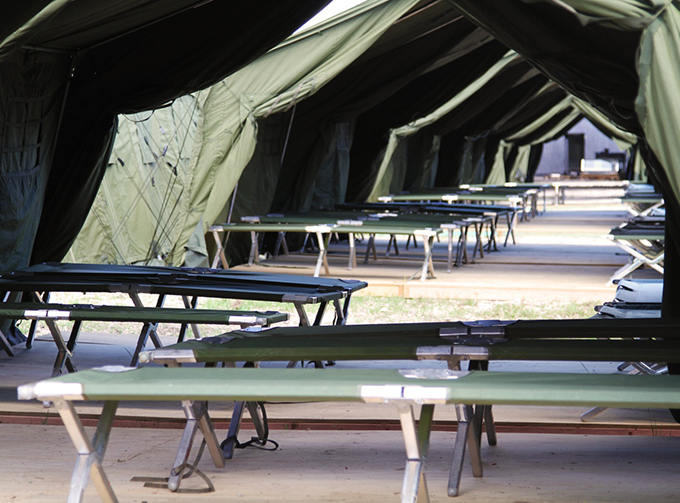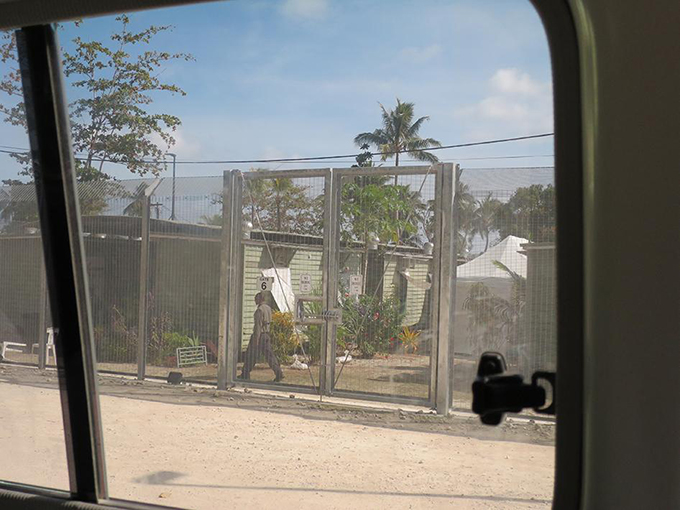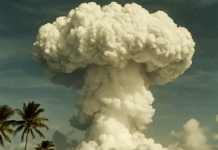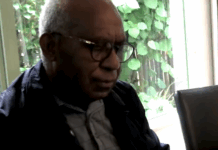
As tensions in Nauru continue to simmer, asylum seekers in Australia’s other immigration centre on Manus Island have been told they would either be resettled or deported. Jihee Junn reviews the status of the two offshore processing centres for Asia Pacific Report.
Tensions have mounted in both Papua New Guinea’s Manus Island and Nauru as the controversial Australian offshore processing detention centres have once again come under fire.
![]() In Nauru, allegations have surfaced from a group of detainees that they were assaulted by guards following a protest.
In Nauru, allegations have surfaced from a group of detainees that they were assaulted by guards following a protest.
The Department of Immigration confirmed that a “disturbance” had occurred at the site, with chairs, tables, and other objects being thrown at service provider staff.
But detainees are accusing the guards of violent behaviour, claiming that they had punched children and thrown rocks and chairs. Two detainees are currently receiving medical treatment.
Addressing these claims, the department denies that any children or women were assaulted during the incident, stating that the event had quickly “de-escalated”.
As tensions in Nauru simmer, asylum seekers in Australia’s other immigration centre on Manus Island were told they would either be resettled or deported.
After more than three years since the camp was re-opened, Papua New Guinea officials announced that 400 out of the 850 men on the island had been found to be legitimate refugees.
60 men refused claims
At least 60 men were reported to have refused to submit their claims, instead asking PNG authorities to transfer them to the United Nations.
Those who failed to file their claims or received “negative” assessments will face deportation.
Those with “positive” assessments will be resettled in Papa New Guinea as part of Australia’s Regional Resettlement Arrangement, otherwise known as the “PNG solution”.
Shrouded with reports of rape and abuse, conditions on both Nauru and Manus Island have long been heavily criticised.
Columnist and founder of refugee awareness initiative Wage Peace NZ Tracey Barnett insists that Australia is failing its human rights obligations.
“I would argue these centres are illegal and I would also argue they are terribly inhumane. Unfortuantely, Australia has seen fit to essentially sell their human rights obligations to poorer countries who need the cash.”
“I would argue that they are in essence trading human lives in the people trading business themselves. Although Australia has tried to stop the boats in Operation Sovereign Borders, the irony is that they’ve become people traffickers themselves.”
‘Justifiable’ Australian view
But University of Auckland’s foreign policy analyst Professor Steven Hoadley says that from Australia’s point-of-view, it’s off-shore detention centres are justifiable.
“The Australian government doesn’t think they’re doing anything wrong. They assert that the asylum seekers are being treated in a humane fashion and they can go back to where they came from at any time.
“The Australian government will actually pay their airfare and put $5000 in their pocket and send them off with a friendly smile. So they’re not actually incarcerated.”
Late last year, the government of Nauru banned all media from reporting from the island state, prompting plenty of concern from rights groups.
Barnett called the ban “a terrible shame” while also criticising Australia’s Border Force Act which severely restricts the freedom of those working in detention centres.
Passed by the Australian Federal Parliament in 2015 with bipartisan support, the Act means that government-contracted staff can face up to two years in prison for speaking to media about conditions in facilities.
In February, the Australian High Court upheld the country’s right to detain asylum seekers off-shore. But for Refugee Action Coalition (RAC) spokesperson Ian Rintoul, detention centres in Nauru and Manus Island breach international law.
“According to Australian law, the off-shore processing arrangements are legal. But it’s very clear that it violates both the spirit and the letter of the refugee convention.”
“We think the situation should go back prior to 1992 when mandatory detention was introduced. We want to see an end to off-shore processing regimes.”

Cambodian programme ‘failure’
Controversy has also surrounded Australia’s resettlement policies for legitimate refugees.
In 2013, then Prime Minister Kevin Rudd announced that no asylum seekers arriving by boat would be resettled as refugees within Australia. Instead, they would be resettled in Cambodia or PNG.
However, it was recently revealed that of the five refugees that had been voluntarily resettled in Cambodia in 2015, only two now remained in the country with the Cambodian government deeming the programme “a failure”.
With millions of dollars spent on the programme, Barnett is among the many critics of the so-called “Cambodia solution”.
“They offered I believe $55 million to resettle any of the refugees whose cases had been decided in Nauru, and what Cambodia did was it put one proviso on that deal, and the proviso was that the refugee had to want to come to Cambodia.”
“So far, only four or five have taken up that offer. So if you divide that by $55 million, that’s a very expensive price tag indeed for what is essentially a failed policy.”
However, a spokesperson for the International Organisation for Migration (IOM), Joe Lowry, whose organisation has been involved in the resettlement programme, says that regardless of the number of those who resettle, some costs are fixed while others are not.
“There are certain costs that have to be paid out whether or not one person comes from Nauru or a thousand come. Things like accommodation, language lessons, teachers, and utilities.”
Vulnerable migrants
He says that despite criticism, the IOM’s decision to involve themselves in the programme was not taken lightly.
“We took the decision that it was best for vulnerable migrants to get off Nauru if they wanted to leave and be in Cambodia. It took us as an organisation about six months to come to that decision. It wasn’t something we did lightly. “
With the general election likely to be held in Australia by mid-year, focus has shifted to the two major political parties.
Professor Hoadley believes little will change following the upcoming election, and says there is broad agreement among politicians about the country’s approach to dealing with asylum seekers.
“There’s definitely a consensus in Canberra among the political elite. When Labour was in office, they reinstituted the Pacific solution, while the current Coalition government is perhaps slightly more robust.
“They created a special Navy task force with a general in charge of it, which is a little bit higher profile, but it’s something that the Navy had been doing for over a decade under both political parties as they alternated in power.”
Rintoul takes a different view, and says that visible differences have started to emerge.
“I think there’s growing disquiet between the Labour party and the Coalition. Labour has been willing to make more critical comments about the slowness of processing.
“Those kinds of issues have similarly become issues inside the Coalition which is an increasing indication that there are serious differences of opinion inside the Coalition as to what policies can be implemented.”
Jihee Junn is a postgraduate journalism student at Auckland University of Technology and is on the Pacific Media Centre’s 2016 Asia-Pacific Journalism Studies course.













































To leave people for years in prison without an end in sight is beyond undemocratic. Return non refugees to their homes; to take in a few thousand a year of genuine refugees is the least we can do, especially since in some cases we helped to destabilise their countries. The refusal to allow people in to report on the camps and spying on the few allowed in reminds one of unsavoury regimes of last century. Why not have the odd orchestra to play nice music for show. Thatt is all that is missing…Shame on both political parties.
Comments are closed.